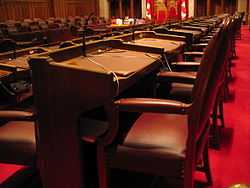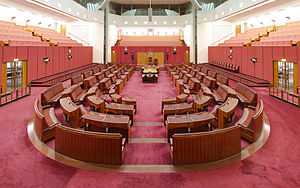Upper house
| Legislature |
|---|
| Chambers |
| Parliament |
| Parliamentary procedure |
| Types |
| Legislatures by country |
An upper house, often called a Senate, is one of two chambers of a bicameral legislature, the other chamber being the lower house.[1]
A legislature composed of only one house is described as unicameral.
Possible specific characteristics
An upper house is usually different from the lower house in at least one of the following respects:
Powers:
- In a "parliamentary system", it often has much less power than the lower house. Therefore, in certain countries the Upper House
- has only limited legislative matters, such as constitutional amendments, require its approval.
- cannot initiate legislation (or cannot initiate legislation on money).
- cannot vote a motion of no confidence against the government (or such an act is much less common), while the lower house always can.
- In a "presidential system":
- It may have equal or nearly equal power with the lower house.
- It may have specific powers not granted to the lower house. For example:
- It may give advice and consent to some executive decisions (e.g. appointments of judges or ambassadors).
- It may have the sole power to try impeachments against officials of the executive, following enabling resolutions passed by the lower house.
Status:
- In some countries, its members are not popularly elected; membership may be indirect, hereditary or by appointment.
- Its members may be elected with a different voting system than that used to elect the lower house (for example, upper houses in Australia and its states are usually elected by proportional representation, whereas lower houses are not).
- Less populated states, provinces, or administrative divisions may be better represented in the upper house than in the lower house; representation is not completely proportional to population (or not at all).
- Members' terms may be longer than in the lower house, and may be for life.
- Members may be elected in portions, for staggered terms, rather than all at one time.
- In some countries, the upper house cannot be dissolved at all, or can be dissolved only in more limited circumstances than the lower house.
- It typically has fewer members or seats than the lower house (though notably not in the United Kingdom).
- It has usually a higher age of candidacy than the lower house.
Powers


Parliamentary systems
In parliamentary systems the upper house is frequently seen as an advisory or "revising" chamber; for this reason its powers of direct action are often reduced in some way. Some or all of the following restrictions are often placed on upper houses:
- Lack of control over the executive branch. (On the other hand, in the US and many other presidential systems, the Senate or upper chamber has more control over the composition of the Cabinet and the administration generally, through its prerogative of confirming the president's nominations to senior offices.)
- No absolute veto of proposed legislation, though suspensive vetoes are permitted in some states.
- In countries where it can veto legislation (like the Netherlands), it may not be able to amend the proposals.
- A reduced or even absent role in initiating legislation.
- No power to block supply, or budget measures (a rare example of a Parliamentary upper house that does possess this power is the Australian Senate, which notably exercised that power in 1975)
The role of a revising chamber is to scrutinise legislation that may have been drafted over-hastily in the lower house, and to suggest amendments that the lower house may nevertheless reject if it wishes to. An example is the British House of Lords. Under the Parliament Acts 1911 and 1949, the House of Lords can no longer prevent the passage of most bills, but it must be given an opportunity to debate them and propose amendments, and can thereby delay the passage of a bill with which it disagrees. Bills can only be delayed for up to one year before the Commons can use the Parliament Act, although economic bills can only be delayed for one month. It is sometimes seen as having a special role of safeguarding the uncodified Constitution of the United Kingdom and important civil liberties against ill-considered change. The British House of Lords has a number of ways to block legislation and to reject it, however the House of Commons can eventually use the Parliament Act to force something through. The Commons will occasionally bargain and negotiate with the Lords such as when the Labour Government of 1999 tried to expel all Hereditary Peers from the Lords, and the Lords threatened to wreck the Government's entire legislative agenda and to block every bill which was sent to the chamber. This led to negotiations between Viscount Cranborne the then Shadow Leader of the House, and the Labour Government which resulted in the Weatherill Amendment to the House of Lords Act 1999 which preserved 92 Hereditary Peers in the house. The Parliament Act is not valid with all legislation and is a very rarely used back up plan.
Even without a veto, an upper house may defeat legislation. Its opposition may give the lower chamber a chance to reconsider or even abandon a controversial measure. It can also delay a bill so that it does not fit within the legislative schedule, or until a general election produces a new lower house that no longer wishes to proceed with the bill.
Nevertheless, some states have long retained powerful upper houses. For example, the consent of the upper house to legislation may be necessary (though, as noted above, this seldom extends to budgetary measures). Constitutional arrangements of states with powerful upper houses usually include a means to resolve situations where the two houses are at odds with each other.
In recent times, Parliamentary systems have tended to weaken the powers of upper houses relative to their lower counterparts. Some upper houses have been abolished completely (see below); others have had their powers reduced by constitutional or legislative amendments. Also, conventions often exist that the upper house ought not to obstruct the business of government for frivolous or merely partisan reasons. These conventions have tended to harden with passage of time.
Presidential systems
In presidential systems, the upper house is frequently given other powers to compensate for its restrictions:
- Executive appointments, to the cabinet and other offices, usually require its approval.
- It frequently has the sole authority to give consent to or denounce foreign treaties.
Institutional structure
There is great variety in the way an upper house's members are assembled: by direct or indirection election, appointment, heredity, or a mixture of these. The German Bundesrat is composed of members of the cabinets of the German states, in most cases the state premier and several ministers; they are delegated and can be recalled anytime. In a very similar way the Council of the European Union is composed of national ministers.
Many upper houses are not directly elected, but appointed: either by the head of government or in some other way. This is usually intended to produce a house of experts or otherwise distinguished citizens, who would not necessarily be returned in an election. For example, members of the Canadian Senate are appointed by the Governor General on advice of the Prime Minister.
The seats are sometimes hereditary, as still is partly the case in the British House of Lords and formerly in the Japanese House of Peers until it was abolished in 1947.
It is also common that the upper house consist of delegates chosen by state governments or local officials. The United States Senate was chosen by the State legislatures until the passage of the Seventeenth Amendment in 1913.
The upper house may be directly elected but in different proportions to the lower house - for example, the Senates of Australia and the United States have a fixed number of elected members from each state, regardless of the population.
Abolition
Many jurisdictions, such as Croatia, Denmark, Hungary, Iceland, Iran, New Zealand, Peru, Sweden, Turkey, Venezuela and most Canadian provinces, once possessed upper houses but abolished them to adopt unicameral systems. Newfoundland had a Legislative Council prior to joining Canada, as did Ontario when it was Upper Canada and Quebec from 1791 (as Lower Canada) to 1968. Nebraska is the only state in the United States with a unicameral legislature, having abolished its lower house in 1934.
The Australian state of Queensland also once had an appointed Legislative Council before abolishing it in 1922. All other Australian states continue to have bicameral systems. Like Queensland, the German state of Bavaria had an appointed upper house, the Senate of Bavaria, from 1946 to 1999.
The Senate of the Philippines was abolished – and restored – twice: from 1935 to 1945 when a unicameral National Assembly convened, and from 1972 to 1987 when Congress was closed, and later a new constitution was approved instituting a unicameral Parliament. The Senate was re-instituted with the restoration of a bicameral Congress via a constitutional amendment in 1941, and via adoption of a new constitution in 1987.
The current government of Ireland promised a national referendum on abolition of the Seanad Éireann during the 24th Seanad session. By a narrow margin, the Irish public voted to retain the upper house. Fine Gael and Sinn Fein both supported the abolition, whilst the conservative-leaning Fianna Fáil was alone amongst major parties in supporting the retention of the Seanad.[2]
Titles of upper houses
Common terms
- Senate - by far the most common
- Legislative Council
- Federal Council (Germany, Austria)
- Council of States (Switzerland, India, Sudan)
- First Chamber (Netherlands and formerly Sweden)
Unique titles
- National Council – Slovenia; also the title of the lower house of the Parliament of Austria
- House of Peoples – Bosnia and Herzegovina
- Protsaphea – Cambodia
- Shura Council (Consultative Council) – Egypt
- Chambre des Pairs (Chamber of Peers) – France under the Bourbon Restoration
- Főrendiház (House of Magnates) in the former Kingdom of Hungary, also called simply Felsőház (Upper House)
- Rajya Sabha (Council of the States) and Vidhan Parishad (Legislative Council) – India
- Regional Representative Council (Dewan Perwakilan Daerah) – Indonesia
- House of Councillors (Japanese: 参議院, Sangi-in) – Japan
- Dewan Negara (National Hall) – Malaysia
- Federation Council - Russia
- House of Elders – Republic of Somaliland. The term senate is derived from Latin senex, meaning "old man".
- National Council of Provinces – South Africa
- House of Lords – Seen in the United Kingdom, Ireland, as well as formerly in German-speaking monarchies (Herrenhaus), e.g. the Austrian House of Lords and the Prussian House of Lords
- House of Federation – Ethiopia
See also
- List of national legislatures
- Lower house
Notes and references
- ↑ Bicameralism (1997) by George Tsebelis
- ↑ http://www.bbc.co.uk/news/world-europe-24404157
| ||||||||||||||||||||||